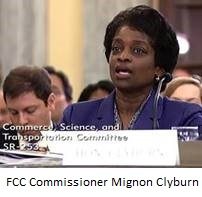
He pledged to “balance the needs of various different types of uses in these bands through effective sharing mechanisms; take steps to promote competitive access to this spectrum; encourage the development of secure networks and technologies from the beginning; and remove unnecessary hurdles to siting and infrastructure deployment.”
Commissioner Mignon Clyburn highlighted the lack of broadband infrastructure in rural areas, saying she recently heard from a software engineer in New Mexico who lives in Albuquerque but his fastest option for fixed broadband is 7.5 Mbps for some $62 a month. “Broadband is a cold, hard necessity in the digital age,” she said.
Clyburn said opening up spectrum above 24GHz is one of many steps towards 5G development while Commissioner Michael O’Rielly said 5G could produce a type of “wireless fiber.” Wireless providers have done the research, conducted testing, and established pilot markets and are “on the verge” of commercial 5G deployment, he said.
O’Rielly said the agency and perhaps Congress can help remove barriers to infrastructure deployment. “Experts estimate that the propagation capabilities (short distances) will require a ten-fold or greater siting of wireless towers and antennas. Some have argued that we may see a million new small cells and DAS antennas deployed in the next five years. All of this infrastructure can’t be sited without approval of decision makers, including private landowners and municipal managers.”
Some Tribal governments and localities want to extract “enormous fees” from providers and use slow processes to review siting applications, according to O’Rielly. The FCC may at some point need to flex its muscles (provided by Congress) to preempt activities delaying 5G deployment.
Wheeler began the hearing by saying he plans to work with the new Administration to ensure a smooth transition after the presidential election, one of the first, if not the first, time he has publicly indicated his plans.
WIA President/CEO Jonathan Adelstein stated: “Based on what we heard at the hearing, members of the FCC and the Commerce Committee clearly ‘get it’ that wireless infrastructure is essential to delivering the benefits of wireless broadband to consumers. A number of senators noted that addressing the barriers to building this infrastructure should be a top priority for the FCC and Congress in the coming months. We are pleased that the Chairman and the Commissioners noted the need to streamline the siting of wireless infrastructure and addressed the need for greater access to federal lands and properties and ‘dig-once’ initiatives…WIA looks forward to working with policymakers to accelerate the deployment of wireless broadband across the U.S.”




Reader Interactions